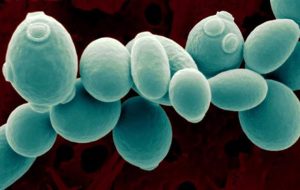A Washington University computer scientist may have cracked a new code to improve biofuel production. Michael Brent, the Henry Edwin Sever Professor of Engineering in the School of Engineering and Applied Science, has learned how to coax cells to do natural things under unnatural circumstances. The key was an algorithm Brent developed called NetSurgeon. The program recommends genes that can be surgically removed from a cell’s genome that would then force the cell perform a normal activity but under a different circumstance.
 For example, Brent says ordinary baker’s yeast cells typically produce a lot of alcohol, aka biofuel, when fed sugar extracted from corn kernels. The cells are convinced to make more alcohol when given a type of sugar found in corn’s leaves and stalks when NetSurgeon designed genetic surgeries to alter the gene’s genome.
For example, Brent says ordinary baker’s yeast cells typically produce a lot of alcohol, aka biofuel, when fed sugar extracted from corn kernels. The cells are convinced to make more alcohol when given a type of sugar found in corn’s leaves and stalks when NetSurgeon designed genetic surgeries to alter the gene’s genome.
“Yeast have been engineered to make alcohol out of xylose, a type of sugar found in the woody parts of plants, but they don’t do it very well,” Brent says whose research was published in PNAS Early Edition. “We think the problem is not that they can’t do it, but that they don’t want to. So we have to convince them by making them use the same set of genes they use when they’re fed sugar from corn kernels. We sometimes think about this as causing the yeast to ‘hallucinate’ that they are in a sugar they like to turn into alcohol.”
“Ultimately,” Brent continues, “what we want to impact is the behavior of the cells and the ways they respond to things. One of the ways they respond is by changing the mix of cellular parts they are making. We’re trying to engineer the cells to change the mix of parts to do something associated with desirable behaviors, like becoming a liver cell or producing a biofuel. We call this ‘transcriptome engineering,’ because it changes the control circuits in order to change the production of many parts at once, rather than focusing on one part at a time.”
The research focuses on changing how much protein is made from each gene through transcriptional regulatory networks. In these networks, the transcription factors, or proteins, are the key components that have the ability to turn genes off and on. Brents says NetSurgeon looks at the current production level from each gene then references the goal level and ultimately suggests transcription factors to remove. This is done through the deletion of genes that encode them, as a means to move production levels toward the goals.
Brent adds that while they are studying yeast, the technique can be applied to any organism. He has made his algorithm NetSurgeon available as open source software at mblab.wustl.edu.

